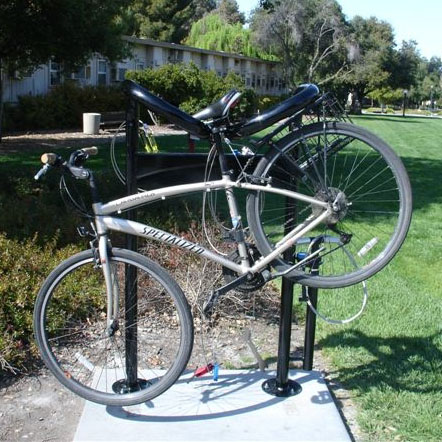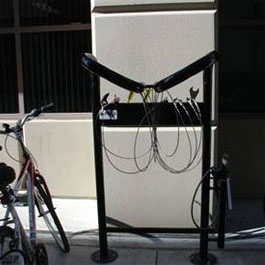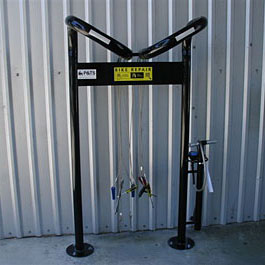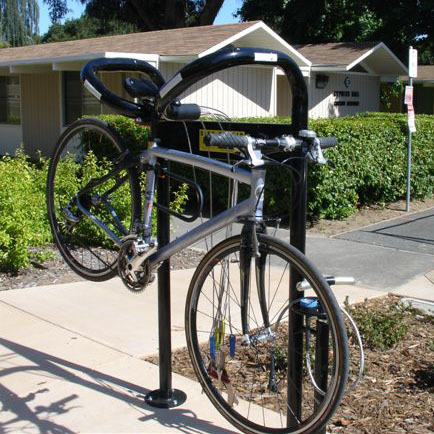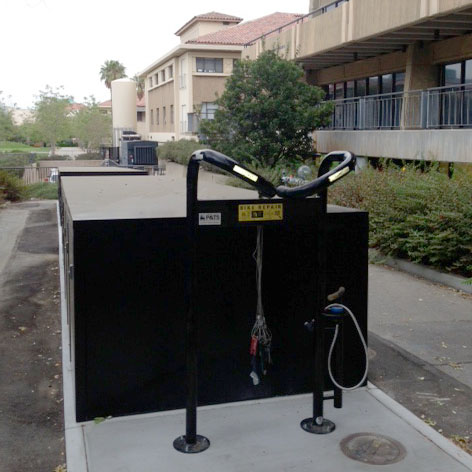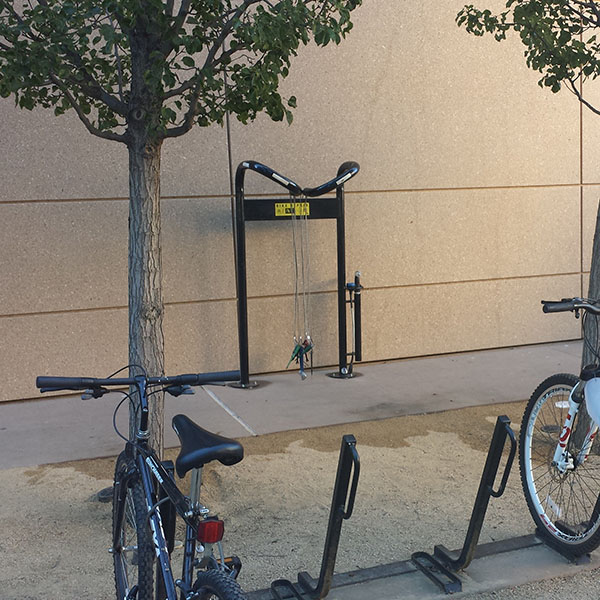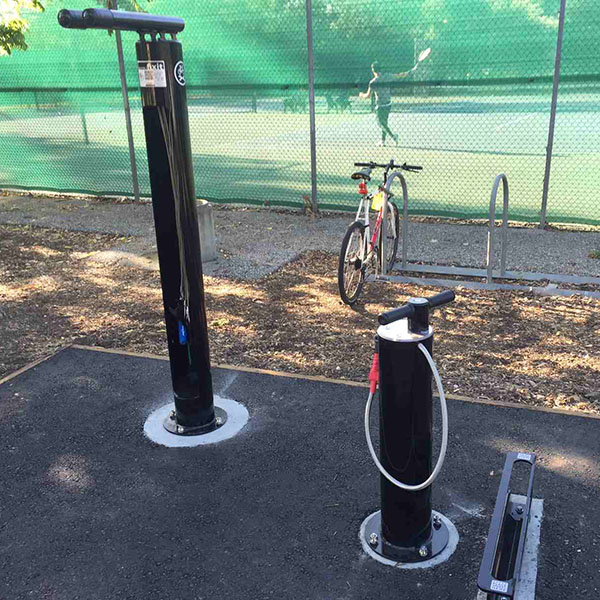Bicycling at Stanford
"Bike to Work" Bike Safety Pledge winner announced
on our Bike Safety Pledge page.Bike Safety Stations on hiatus for the summer
The Bike Safety Stations at White Plaza will return in the fall of 2015On this page:
- Introduction
- Bike education opportunities
- Bicycle safety repair stands at Stanford
- Bicycle helmet promotions
- Folding bicycle promotion
- Bicycle parking and security
- Bicycle registration
- Bicycle storage lockers
- Clothes lockers & showers
- Bicycles on public transit
- Bicycling safety tips
- Palo Alto Bikestation
- Buying & selling used bicycles
- Resources for all nonmotorized commuters
- Resources/Advocacy organizations
- Bicycle route maps
- Bicycle-related press
Other bicycle program pages:
- Bicycle Safety Testimonials
- Bicycle Safety Educational Efforts at Stanford
- Bike Resources for New Students
- Meet Sprocket Man!
- Helpful Hints for Walking and Biking to Work (or Transit!)
- Bike Questions and Answers
- Get Ready to Roll
- Sample Bike Routes
- Take the Stanford Bike Safety Pledge
- How to Start a Department Bike Share Program
Introduction
Bicycling is ideally suited to the Stanford area's mild climate, flat terrain and gentle, rolling hills. It's a quiet, affordable, and healthy way to get around. It's also an antidote to the South Bay's growing traffic congestion, noise and air pollution. Bikes aren't just for fun anymore - a growing number of people are choosing to commute on non-motorized wheels. No more playing "musical chairs" in the parking lots. There is plenty of free bicycle parking on campus - an estimated 18,000 bike rack spaces.
Whether biking recreationally or commuting to work or class, Parking & Transportation Services can help you with:
- Bike registration
- Biking Around Stanford brochure
- Mid-Peninsula Bicycle Map (covers Palo Alto, East Palo Alto, and Menlo Park; shows recommended routes).
- City and county bike maps (you can access the Santa Clara Valley Bikeways map online to pinpoint bike routes all the way from Palo Alto to Gilroy, bordered by Milpitas, Los Gatos, and the Los Altos Hills)
- Brochures to make your ride easier and safer
- Clothes locker and bike storage rentals, and information on the location of showers
Contact the campus Bicycle Coordinator
If you have specific questions on bicycling on campus, please call 725-BIKE (2453), stop by Parking & Transportation Services, or email bike-information@stanford.edu.
Community online bicycling resources
You can also get information on local cycling, bike shops, and bicycling organizations by visiting the following:
- 511.org will provide you with basic information on getting started, offer advice from experienced bike commuters, and locate bike resources around the Bay Area
Features
 Stanford is a platinum-level "Bicycle Friendly University"
Stanford is a platinum-level "Bicycle Friendly University"
This prestigious designation recognizes Stanford's efforts to create an exceptional environment where bicycling can thrive. Read more at the League of American Bicyclists' website. • Complete list of designated universities that have been recognized to date. • News from the League: "9 of Top 10 National Universities Now BFUs"
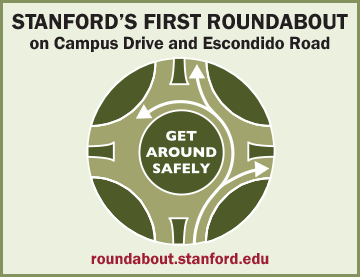

Take the Stanford Bike Safety Pledge!
Commit to wear a helmet every time you ride your bike and to follow the rules of the road when biking and walking.

Bike Safety & Bike Citation Diversion Classes
• Wednesday, June 3 @ 4 p.m.
• Tuesday, June 9 @ 4 p.m.
No cost to attend! Class flyer
Read program description and registration information
 Bike helmets for $25
Bike helmets for $25
The Campus Bike Shop and P&TS have teamed up for this special offer. View all models in stock (All colors may not be available).
Bike education opportunities
Bike Safety & Bike Citation Diversion Classes
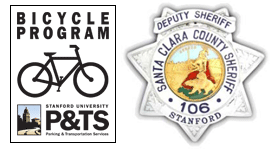
Fix your bike ticket! In lieu of paying a fine or going to court for a bicycle citation, you may elect to participate in the Bicycle Diversion Program sponsored by the Stanford Department of Public Safety and Parking & Transportation Services.
This program is available only during the first 30 days from the date the citation was issued. After that time period, the citation will be sent to the court for normal processing. You may re-take this class after 18 months, just like drivers traffic school. If you have any questions, please contact SUDPS during office hours at (650) 723-9633.
- Call (650) 723-9633 or check the Bicycle Programs page of the Department of Public Safety website for the date, time and location of the next available bicycle safety presentation.
- Enroll and attend a 60-minute bicycle safety presentation put on by the Department of Public Safety and Parking and Transportation Services. You can register online at the Department of Public Safety website.
- Bring the certified card, your copy of the citation, and a picture ID to the presentation.
- Correct and have a deputy sign off any license or mechanical violations prior to attending the safety presentation.
- If you complete the program within the 30-day period, the bike citation will be dismissed.
- This free class is open to the campus community to learn more about bike safety, rules of the road, and how to ride on the campus.
- Take the class and receive a coupon worth $10 off a bicycle helmet at the Campus Bike Shop.
Read the Stanford Report article on the program.
Bike Repair Clinics at the Campus Bike Shop
- Professional bike mechanic on duty to answer questions
- Tools and stand available for your use
Learn How to Ride a Bike
Never learned how to ride a bike? We can teach you. Most people can learn the basics of riding a bike in two hours. Send an email to bike-information@stanford.edu to be notified when the next class will be held.
White Plaza Bicycle Safety Stations
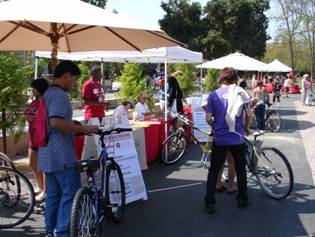
- Held every Friday at White Plaza, 11 a.m. - 2 p.m. (weather permitting)
- Come and register your bike, get a free bike safety check-up, pump up those tires and ask questions about bike laws and how to ride on campus.
- Learn how to lock your bike up properly—avoid bike theft.
Bicycle safety repair stands at Stanford
The repair stands enable bicyclists to make minor repairs and pump up their tires for free, making it more convenient for the campus community to maintain safe bicycles. Multiple tools are securely fastened to the rack, which also serves as a bike stand.
Locations
- The intersection of Galvez Mall and Escondido, near the Galvez Modular
- School of Medicine across from the Li Ka Shing Center (LKSC) bike lockers, between the bike racks along the east side of Beckman
- Parking & Transportation Services, 340 Bonair Siding, at the front entrance
- Jerry Yang and Akiko Yamazaki Environment and Energy (Y2E2) Building, near Cypress Hall and the bike lockers
- Durand bike locker compound, between Green Earth Sciences and Durand
- Advanced Medicine Center (AMC) Cancer Center, bike locker compound, near Blake Wilbur Clinic (875 Blake Wilbur Drive)
- Escondido Village (EV) near McFarland Ct. along the EV spine path, next to the tennis courts.
Bicycle helmet promotions
- In partnership with the Campus Bike Shop, Stanford offers a quality bicycle helmet for $25.
- Those who participate in Stanford’s Bicycle Safety/Diversion Class receive a coupon for $10 off any helmet at the Campus Bike Shop.
- Wearing a bike helmet can reduce your risk of head injury by 85 percent, according to David Spain, chief of trauma and critical care surgery at Stanford University Medical Center.
Folding bicycle promotion
P&TS invites you to try some of our special folding bike offers, brought to you in partnership with the Campus Bike Shop:
- Free one-week rentals on folding bikes by Dahon
- $100 subsidies for certain models of folding bikes
Eligibility restrictions apply.* Offer valid for selected models.
Please email bike-information@stanford.edu to take advantage of this promotion. You will be added to the official "folding bike list," which is managed by the Bike Coordinator and is required to receive the free rental or discount promotion.
*Eligibility restrictions: Individuals must live off campus, be required to be on campus during business hours at least half-time (if employee) or be registered in classes (if student) for three consecutive months or more; and be required to display a parking permit issued by Parking & Transportation Services in their vehicle (if they chose to drive) at their principal place of work or study. Limit one per person.
Resources
- Download the Mid-Peninsula Bike Map
- Bikestation Palo Alto offers 24-hour access and safe bike storage at the Palo Alto Caltrain station.
Bicycle parking and security
- Most thefts can be prevented by properly securing the bicycle with an adequate lock, to a secure parking facility such as a bike rack. U-locks, such as Kryptonite, are recommended, but a knowledgeable thief can easily defeat even these. A 6-foot cable or chain (the thicker the better) used with a U-lock allows you to lock to any rack and secure your wheels as well.
- Be aware that any cable is easily cut. Don't entrust your good bicycle to a cable alone. Most bike thefts on campus are due to "cut" cable locks.
- When parking your bike, don't obstruct walkways, railings, doorways or ramps intended for use by pedestrians or people with disabilities. Improperly parked bikes will be removed and impounded by Stanford Public Safety. Utilize bicycle racks whenever possible.
If your bike is stolen, follow these instructions:
- Report a stolen bike to Stanford Public Safety Department immediately, 723-9633 or call the local police department within the community where the bike was stolen. To report a theft or other crime in progress call 9-911 on campus phones, 911 from other phones.
- Provide the Bike Registration Number, Serial Number, Make, Model, Size and Color
Abandoned bicycles:
If left unattended, a bicycle may be tagged by the Stanford University Department of Public Safety as abandoned. If the bicycle is not removed in 2 weeks, the department may claim it. This abatement process is performed in student living areas and other parts of campus on an ongoing basis. So please, we recommend you do not store your bike for more than 24 hours by locking it to a bike rack, or it may be removed by the time you return. Register your bike so you can be notified in the case that it is picked up as abandoned.
For questions about abandoned bikes, go to the Department of Public Safety website.
Bicycle registration
All bicycles used on campus must be licensed, as required by the Stanford University Traffic & Parking Code:
Chapter 7: BICYCLE LICENSING
Section 7.1 Licensing of Bicycles Required.
(7.1.1) All bicycles used, stored, parked or operated on Stanford property shall be licensed with a valid California bicycle license. Every bicycle must display a valid state-issued sticker imprinted "California Bicycle License" including a unique registration number and a valid state-issued renewal sticker imprinted "California License Renewal" and "Date of Expiration Dec. 31, 20XX" indicating a current registration and including a unique registration number. In this chapter "bicycle" also refers to motorized electric bicycle and motorized scooter.
Note: Proof of ownership may be required to register and license a bicycle.
Register your bike at the Parking & Transportation Services office, 340 Bonair Siding; it's your only chance of recovering it if stolen. The registration fee is $3.50 and lasts for up to three years. There is a short bike registration form to complete. Please note that you must have your bike with you for us to verify the serial number that is engraved on the bike.
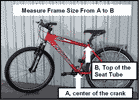
Some of the questions you'll be asked include:
• Frame size (see photo [JPG, 66 KB] on how to measure frame size; yard sticks are available in our office)
• Wheel size (usually listed on the bike tire)
• Bicycle serial number (usually located under bottom bracket of bike)
If you have any difficulty finding this information, ask one of our staff members, and we'll be happy to help you.
Bicycle storage lockers
- We have 13 bike locker compounds located on the campus with capacity for over 280 bikes.
- 3 bike cages also provide safe storage for bikes, located in Parking Structure 5 (Stock Farm), Parking Structure 7 (at Knight Management Center), and the Beckman Center.
- Bike locker and bike cage rental fee is $48 annually with a refundable $25 key deposit. Download an application from the Forms/Applications page.
- If you'd like more information on rental availability or a map of these locations, send an email to the Bike Coordinator, or stop by our office for more information.
Clothes lockers and showers
Stanford offers several clothes lockers and showers around campus for bike commuters. The rental fee for the clothing lockers is $36 annually. Download an application from the Forms/Applications page.
If you'd like more information on rental availability or a map of these locations, send an email to the Bike Coordinator, or stop by our office for more information.
Bicycles on public transit
![thriving at stanford [without a car] - free resource guide to public transit](/was/20140911222256im_/http://transportation.stanford.edu/images/thriving_ad_Oct2014.jpg)
thriving at Stanford [without a car] (PDF)
Experience all the Bay Area has to offer—the beaches, nightlife, shopping, and the great outdoors—all by using Stanford's and the Bay Area's public transportation options.
All the public transportation options in the Bay Area are bike friendly too. Caltrain, VTA buses, VTA Light Rail, BART and even the Stanford Marguerite shuttle accommodate bicycles with bike racks to mount bikes or with on board capacity. Refer to specific sites for rules and regulations as there are restrictions on some modes of travel: Caltrain (800.660.4287), VTA (408.321.2300), and BART. In addition, a great reference for all transportation-related services is located at http://transit.511.org.
- Caltrain operates two types of train cars that accommodate bikes. Gallery (enter through one door) and Bombardier (enter through two doors). The gallery train set can accomodate 80 bikes (40 in each of two bike cars), while the Bombardier train set can handle 48 bikes (24 in each of two bike cars). The gallery and Bombardier sets aren't always used on the same train numbers. Look for the yellow sticker on the northern-most train car. Because of high demand, there may be insufficient bike space at commute hours, especially on southbound AM and northbound PM express trains. This is especially true during on Bike to Work Day in May, so plan accordingly. For more information on bikes on the Caltrain, check out the Caltrain Frequently Asked Questions (FAQ) section.
- Folding bikes are allowed on BART and Caltrain (see each agency's website for folding bike policies). You can learn about folding bikes at http://www.foldsoc.co.uk/. Now is the time to consider owning such a bike! Read about our current folding bicycle promotion.
- All Santa Clara County (VTA) buses can carry 2 bikes on front-mounted racks and 2 more inside the bus at driver's discretion.
- The Dumbarton Express bus from the Union City BART station can carry 2 bikes on front-mounted racks.
- VTA Light Rail vehicles carry 4 bikes per car in the center swivel section; each train typically has 2 cars.
- Stanford's Marguerite Shuttles carry up to 2 bikes.
- The Line U bus from the Fremont BART station and Centerville ACE Train station can carry up to 6 bikes per bus.
Bicycling safety tips
- Always wear a helmet
- Register your bike
- Don't use a cell phone while riding unless using a hands-free device
- Ride at a safe speed for conditions
- Have your brakes adjusted and working properly, refer to the pre-ride safety checklist (PDF, 34 KB)
- Stop at stop signs
- Ride on the right side of the roadway
- Yield to pedestrians in crosswalks
- Ride in the correct direction in one-way areas
- Use lights when riding after dark
While riding your bicycle, obey all traffic laws and buy and wear a bicycle helmet! Helmets can greatly reduce the risk of head injuries and death. Don't "hit the road" without one! However, even the best helmet has limitations. Defensive cycling is the key to bicycle safety. According the California Vehicle Code, every person riding a bicycle upon a street or highway has all the rights and responsibilities of the driver of a motor vehicle. You may be cited for running stop signs, riding at an unsafe speed for conditions, riding on the wrong side of the road or upon sidewalks, wearing headphones while riding, talking on a cell phone without a hands-free device, not having legal brakes, etc. Cyclists are required by state law to use front white lights, rear red reflectors, pedal and side reflectors at night. Additional lights are a good idea, especially red rear flashers, light colored clothing, and extra reflectors.
More information about bicycle safety
- Bike Safety Flyer
- Stanford’s Education and Outreach Efforts
- Bike Safety Pledge
- Video Testimonials on Bike Safety
- Discount on Bicycle Helmets
- California DMV Bicycle Safety website
Palo Alto Bikestation
The concept of the newly reopened Palo Alto Bikestation is modeled after the Long Beach Bikestation and thousands of successful European and Japanese bike facilities which operate today. Amenities include bike parking, commuter and recreational rentals, bike repairs, basic bicycle accessory sales, changing room and an outdoor seating area with concessions.
The Palo Alto Transit Center is a central hub for the Caltrain commuter train line, SamTrans bus lines, Valley Transportation Authority (VTA) bus lines, and the Dumbarton Express, as well as Stanford University's Marguerite Shuttle. The Bikestation facility is located on the North side of the Depot on the train boarding platform adjacent to the bus loading/unloading area. The Bikestation brings meaning to the term "intermodal transportation" providing Palo Alto with one of the best examples in the country.
The Palo Alto Bikestation is a project of the City of Palo Alto and is managed and operated by Palo Alto Bicycles. For more information, visit: http://www.bikestation.org
Buying & selling used bicycles
Used bicycles offer a less expensive, functional alternative to buying a new bike. For individuals looking to buy a used bicycle, or for those trying to sell one, look here for the best places in the area to buy, sell or advertise a used bike.
Bike shops
There are over 15 bicycle shops in the area of campus, even a shop right on campus for your convenience. Listed below are a few that offer full-service bicycle sales, repairs and more within a 2-mile radius.
- Campus Bike Shop
459 Lagunita Dr., Unit #12, Stanford, CA 94305 (Located in Tresidder Union next to the Coho Coffee House)
(650) 723-9300 - Cardinal Bike Shop
1955 El Camino Real, Palo Alto, CA 94306 (just north of Stanford Avenue, next to Sundance Mine Co. restaurant)
(650) 328-8900 - Menlo Velo Bicycles
433 El Camino Real, Menlo Park, CA 94025 (North of the Stanford Shopping Center)
(650) 327-5137 - Mike's Bicycles
2180 El Camino Real, Palo Alto, CA 94306 (Between Stanford Avenue and College at Oxford)
(650) 493-8776 - Palo Alto Bicycles
171 University Avenue, Palo Alto, CA 94301 (Downtown Palo Alto)
(650) 328-7411 - The Bike Connection
2086 El Camino Real, Palo Alto, CA 94306 (just south of Stanford Avenue, near Escondido Village)
(650) 424-8034 - The Bike Connection
622 Santa Cruz Avenue, Menlo Park, CA 94025 (Downtown Menlo Park)
(650) 327-3318
Department of Public Safety
Public Safety sells some of the abandoned bikes at Stanford. The bikes are repaired then sold starting at $30 — a great bargain. Get more information on the annual bike sale at the Stanford Public Safety website.
The Salvation Army
The Salvation Army receives abandoned bikes that are not claimed or purchased by departments during Stanford Public Safety's annual bike sale.
Salvation Army outlets in the SF Bay Area
- 1270 Marshall St., Redwood City / (650) 368-4643
- 405 N. 4th St., San Jose / (408) 283-3864
- San Francisco locations:
- 360 4th St. / (415) 777-3677
- 520 Jessie St. / (451) 575-4848
- 133 Shipley St. / (415) 553-3584
- 1806 Linda Dr., Pleasant Hill / (925) 685-6900
- 812 Pacific Ave., Santa Cruz / (831) 429-8118
- 13577 San Pablo Ave., San Pablo / (510) 236-0847
The online su.market usenet newsgroup
Many bikes and other items are bought and sold using an online bulletin board. You can access the su.market newsgroup via Google Groups.
Resources for all nonmotorized commuters
- Clean Air Cash Rewards (we'll give commuters up to $ 300 /year for not driving alone on to campus)
- Commuter clothes lockers: Most buildings: $36/yr through Parking & Transportation.
- Arrillaga and Roble Gyms have lockers, which they rent to staff, faculty, and students. Those lockers cost: $50/yr (faculty & staff), $35/yr (student).
- Showers in several buildings and gymnasiums
- Bicycle Tutor (Video tutorials courtesy of bicycletutor.com. Learn how to fix your own bike!)
Resources for anyone not driving solo on a given day
- Emergency Ride Home (for emergencies like bike breakdowns, up to 4 times a year - effective after one-time registration with Parking & Transportation Services. And it's free!)
Resources/Advocacy organizations
Bay Area
- Bicycle Friendly Berkeley Coalition, dedicated to improving bicycling in Berkeley, California and EBBC's sister organization
- Bay Area Bicycle Coalition
- BikeAlameda
- San Francisco Bicycle Coalition
- Silicon Valley Bicycle Coalition (SVBC)
- Marin County Bicycle Coalition
- Responsible Organized Mountain Peddlers (ROMP), http://www.romp.org/
Beyond
- Bikes Belong Coalition, http://www.bikesbelong.org/ Bikes Belong is sponsored by the U.S. bicycle industry with the goal of putting more people on bicycles more often
- California Bicycle Coalition, protecting the rights and promoting the interests of California's bicyclists
- CA Association of Bicycling Organizations (CABO)
- International Mountain Bicycling Association (IMBA) http://www.imba.com/
- League of American Bicyclists, protecting the rights and promoting the interests of bicyclists nationwide
- National Center for Biking and Walking, resources and data on bicycling
- Thunderhead Alliance, the national coalition of state and local bicycle advocacy organizations working in unison to break down the barriers to safe bicycling in American communities
Bicycle route maps
- Mid-Peninsula Bicycle Map (PDF, 2 MB)
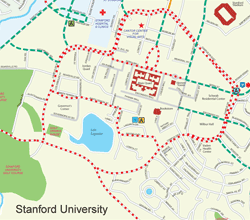 February 2009 edition. Currently this map is available only as on-line resource. In an effort to be green and reduce paper, we are no longer printing hard copies. Please send any changes and/or requests for suggested bike routes to the Stanford campus to bike-information@stanford.edu.
February 2009 edition. Currently this map is available only as on-line resource. In an effort to be green and reduce paper, we are no longer printing hard copies. Please send any changes and/or requests for suggested bike routes to the Stanford campus to bike-information@stanford.edu.
- http://svbcbikes.org/resources/maps has a list of local bike maps
- Santa Clara Valley Bikeways Map (PDF, 1.28 MB) from Valley Transit Authority (VTA)
- Pedestrian Pathways and Bikeways (JPG, 416 KB) from Stanford University Community Plan
- 511.org Bike Mapper - an interactive mapping tool that displays Class I, II and III bikeways in the nine-county Bay Area.
- Google Maps - Map your biking or walking route.
Bicycle-related press
Stanford Daily
- Bike Helmet Campaigns: What Works and What Doesn’t (2-16-2011)
- Students: Befriend Your Brain (2-22-2010)
- Stanford Awarded Platinum Bicycle Friendly Award (4-1-2011)
Stanford Report
- With 15,000 bicycles on campus, police worry about safety (9-27-2010)
- Campus groups raising funds for visiting researcher who died after campus bike crash (2-15-2010)
- Bike coordinator to faculty and staff: be a role model; wear a helmet (11-3-2009)
- Sprocket Man visits the Children's Center of the Stanford Community (Cardinal Chronicle, 4-1-2009)
- Inventive students focus on bike safety (3-4-2009)
- Bike safety innovation contest announced (11-19-2008)
- Letter: Brodie Hamilton, director of Parking and Transportation replies (7-27-2005)
- Brain teasers that students can touch (2-16-2005)
School of Medicine: Dean Pizzo's Newsletter
- Stanford Trauma Bike Safety Summit (10-10-2011)
- Progress on Bike Safety -- Hopefully (8-29-2011)
- Medical Students Advocate for Bike Safety (5-9-2011)
- Bike Safety: Yes and No (3-7-2011)
- Bike Safety -- A Continuing Issue (11-8-2010)
- Bike Safety on Campus – Again (10-20-2008)


